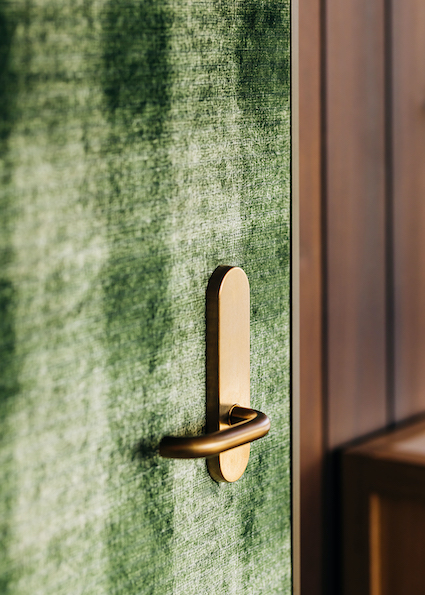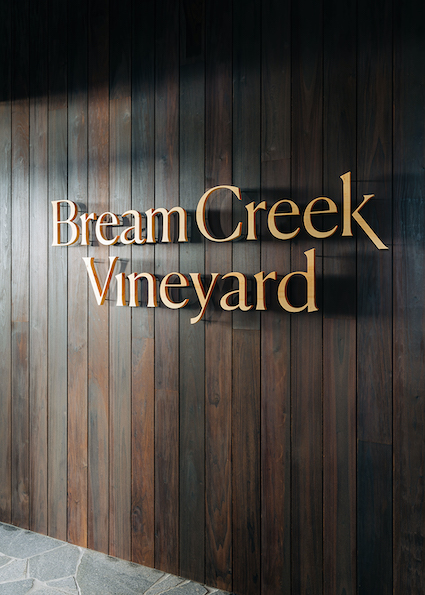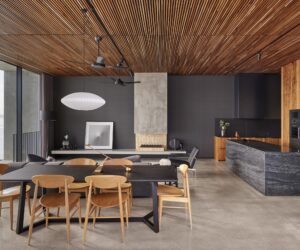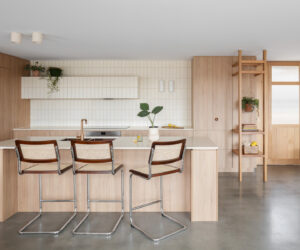A sparkling history of fine wines and exquisite timber
Bream Creek Wines celebrates the opening of their newly established Cellar Door
Bream Creek is a hidden pocket of Tasmania’s East Coast that leaves a long-lasting impression on its visitors and to those who call it home. Whether they’re visiting the bustling and treasured farmers market on the first Sunday of the month or taking a leisurely walk along the pristine shores of Marion Bay Beach, the area’s idyllic rolling hills and majestic coastline are world class. And its treasures don’t stop at the scenery and markets.
The region is also home to Bream Creek Wines, a heavily awarded and long-time staple in Tasmania’s rich and growing wine industry. Having been awarded 56 wine show trophies and over 1000 wine show medals, Bream Creek Wines founder and viticulturist Fred Peacock has also been recognised with an award for outstanding service by an individual to the Tasmanian Wine Industry and was Gourmet Traveler Wine Magazine’s “Viticulturist of the Year” in 2018. In tandem with deep generational ties to agriculture within the state, a connection to the state’s timber industry is an important part of Fred Peacock’s personal and family history. It is also a key reason why he selected two of Tasmania’s top timbers to be featured in his newly opened cellar door.
A cellar door to blend with the landscape
After years in the industry, the decision was made to establish their own foothold amongst Tasmania’s growing list of cellar doors. Working closely with Jed Murphy and Jade Nottage from Sydney based Interior Design firm Tom Mark Henry and Tasmanian based architecture studio Dunbabin Architects, Peacock wanted the cellar door to rest amongst the landscape and for the building’s materials to reflect this.
“The site of the cellar door is also home to 40-50 gum trees that line the nearby creek and the periphery of the landscape so using a Eucalypt in the building was a no-brainer. The tones of the timber match some of the darker leaves from the surrounding Eucalypts and give the effect that the building has always been a part of the landscape,” says Peacock.
Approaching the cellar door, guests enter the space through large Tasmanian Oak doors, treated with an Intergrain oil to bring out depth in the timber, enhancing the beautiful grain the timber is known for.
History with Huon Pine
While the Tasmanian Oak doors make a statement, it’s the custom Huon Pine sign that greets guests upon stepping through the cellar doors that Peacock says holds a special meaning.
“My family has had a long association with Huon Pine. My father was involved in putting together a system to rescue Huon Pine when Pedder was flooded. He also had a long history working at a saw milling company and as a family, Huon Pine yachts have been in our family for generations. We definitely have an affinity for it.”
“Huon Pine is innately Tasmanian, you can’t find it anywhere else. It has the most beautiful grain so we knew it would be the perfect timber for the entry sign. The timber we used came from the West Coast of Tasmania and we were lucky to find a section clear of any knots.
“We kept the foyer simple to let the Huon Pine sign to stand out against the chocolate cladding behind it. The timber sign will darken a bit with time and is just beautiful. It’s a key feature to the cellar door,” says Peacock.
A Tasmanian Experience
Tom Mark Henry Designer, Jade Nottage agrees that the materials used allowed for the cellar door to beautifully blend in with the natural environment.
“Our desire was to create a space that would sit quietly in the landscape and not feel too polished or finished; the use of timber was essential to the success of achieving this. The layered tones and varying finishes of the timber created depth and diversity and produced a beautiful warmth to the space.”
“The space is so much more than a cellar door that you’d pop into for a quick visit. It’s about the wine but not at the expense of the experience. The established warmth lends itself to lingering and slowly indulging in the cheese, the wine and the local produce on offer and taking it all in by the comfort of the fire.”
“Wrapped in timber, it’s a cozy and comfortable place that you’d want to spend some time in in the winter but I also imagine it will be equally beautiful in the summer with the doors wide open and sun streaming in. The second you step in, it just feels good to be there,” says Nottage.
Working closely with the architect, builders and tradespeople, Nottage says the highly collaborative project was also a celebration of the local.
“From the locally sourced timber to the incredible stone and beautiful light fixtures we found in Melbourne, we tried to source as many local Tasmanian and Australian products as possible. The timber was the most important aspect in the gathering of local materials and we relied heavily on the builders to help with that. It was a big team effort to pull it all together,” says Nottage.
Now offering a place for both locals and visitors alike to enjoy the scenery and an award-winning glass of wine, Peacock says the cellar door is fitting of the Tasmanian experience.
“As a Tasmanian wine producer, people come down from the mainland for a Tasmanian experience. They’re not coming down to enjoy a glass of wine around white plastered walls. The timber we selected speaks to Tasmania and adds a nice warmth to the space.”





